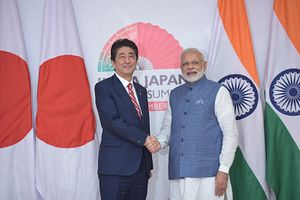On Monday, U.S. Secretary of State Rex Tillerson, Indian Minister of External Affairs Sushma Swaraj, and Japanese Minister of Foreign Affairs Taro Kono met for a trilateral meeting on the sidelines of the United Nations General Assembly in New York.
The meeting was the second U.S.-India-Japan Ministerial-level Trilateral Dialogue. The three senior officials discussed a range of international matters, ranging from the threat posed by North Korea, which had just flown another ballistic missile over Japan last week and conducted a nuclear bomb test earlier in the month, to the South China Sea.
According to a readout of the meeting released by the U.S. State Department, the “ministers discussed the importance of a free and open Indo-Pacific region underpinned by a resilient, rules-based architecture that enables every nation to prosper.”
All three countries have reiterated the importance of a rules-based order in Asia in their recent high-level bilateral statements as well. Most recently, Indian Prime Minister Narendra Modi hosted Japanese Prime Minister Shinzo Abe in India.
“The ministers also affirmed the importance of the freedoms of navigation and overflight and the free flow of lawful commerce in the region and around the globe, including in the South China Sea,” the U.S. readout continued.
On North Korea, according to the U.S. readout, the three ministers “affirmed and applauded the international community’s firm resolve to oppose the DPRK’s unlawful acts, as reflected in UN Security Council Resolution 2375, and called for continuing international action to curtail the DPRK’s nuclear and ballistic missile programs.”
A readout released by the Indian side emphasized that the three ministers discussed “connectivity initiatives” in Asia. The Indian readout noted that “the importance of basing them on universally recognized international norms, prudent financing and respect for sovereignty and territorial integrity was underlined.”
The U.S. statement echoed this as well, noting discussion on efforts to “expand cooperation on regional connectivity.”
In May, India stated its opposition to China’s Belt and Road Initiative and chose not to attend Beijing’s Belt and Road Forum. In June, when Modi met U.S. President Donald J. Trump in Washington, D.C., the two also referred to connectivity cooperation in their statement.
Japan and the United States, meanwhile, do not participate in China-led institutions like the Asian Infrastructure Investment Bank (AIIB), which was set up to assist in the implementation of various connectivity projects. India is a founding member of the AIIB.
Trilateral cooperation between India, Japan, and the United States has been steadily expanding in recent years. In 2015, Japan was formally added to the U.S.-India Malabar naval exercise as the third permanent participant, effectively trilateralizing the drills.
The first ministerial meeting between the three countries took place in September 2015 and was also hosted in the United States. Prior to that meeting, high-level trilateral coordination was ongoing, but at a lower diplomatic level than that of foreign ministers.

































